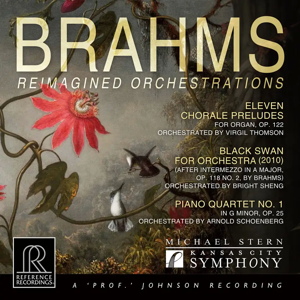
Johannes Brahms (1833-1897)
Reimagined Orchestrations
Eleven Chorale Preludes for organ Op.122 (orch. Virgil Thomson)
Intermezzo in A minor Op.118 No.2 “Black Swan” (orch. Bright Sheng)
Piano Quartet No.1 in G minor Op.25 (orch. Arnold Schoenberg)
Kansas City Symphony/Michael Stern
rec. 2019, Kansas City, Missouri, USA
Reference Recordings RR-152 [79]
The concept of this disc – other composers’ orchestrations of Brahms – gave us the predictable First Piano Quartet in Schoenberg’s orchestration, plus the unexpected: Eleven Chorale Preludes and an Intermezzo. Edmund Rubbra’s orchestration of the Variations and Fugue on a Theme by Handel is one other major reimagining I can think of. It is a pity that it could not be included amongst this collection; a single CD is not spacious enough.
The Piano Quartet orchestration is very enjoyable to listen to on a fine recording, or in concert. I mention the latter, because at three performances in Manchester I heard people at the entrance whisper that they did not like Schoenberg. By the end of the work, the auditorium would erupt in appreciative applause. Naturally, most of this is due to Brahms’s inspiration. Perhaps few concert-goers would encounter the original chamber version. The combination of Brahmsian melody and sympathetic orchestration in the first three movements would obviously go down well. But it was the riotous last movement – where Schoenberg went over-the-top with a most un-Brahmsian instrumentation – that always brought much enthusiams from the audience.
And so it should do, because it is a riot. Schoenberg whips the Hungarian Rondo up to a frenzy, and the brass and woodwind sections have a field day. I think the contrabassoon makes the most impolite noises, and they come off very well as recorded here. I like to hear its ear-tickling contribution placed reasonably forward in the recording, and that is handled nicely. Schoenberg is reasonably respectful in the first three movements, although there are occasional percussive outbursts.
The performance is excellent, propulsive where necessary and nicely relaxed elsewhere. I had not heard of either the orchestra or conductor, but on this showing they are a very good combination.
My favourite recorded performance is by Robert Craft and the Chicago Symphony Orchestra (Sony Classical 82876-78746-2). I have little doubt the Craft turns in a more physically exciting performance, which really sets the work, especially the last movement, alight. In the coda of that movement, Craft whips up the magnificent orchestra to a dizzy whirlwind which takes my breath away. Sonically, the 1964 recording cannot hold a candle to this issue. Yet, so vital is the playing that I soon forget that the sound is thin and bass-light.
The shortest piece on the disc, at seven minutes, is Bright Sheng’s orchestration of the Intermezzo Op.118 No.2. Sheng is a much-honoured composer, performer and academic. For some reason, he chose to give the name Black Swan to his arrangement. Such naming is a highly unorthodox decision, but no matter. I have enjoyed his re-imagining very much. It has also sent me back to the original, and that led to a greater appreciation of the work. Sheng has introduced beautiful sounds in the brass and harp. The central climax is sumptuous but not overbearing or out of character for the very gentle, almost restful piece.
I deliberately chose the word ‘restful’. The first piece here was commissioned in 1956 by Edward B. Benjamin, a wealthy American businessman and philanthropist, who in 1970 published a book entitled The Restful in Music. Composer and critic Virgil Thomson’s orchestration would not raise hackles. Climaxes are not excessive, and it would seem they occur in line with the underlying text of the Lutheran hymns.
Brahms composed the chorales, his last work, for organ. That is why the orchestration of several pieces (among them the first, My Jesus Calls to me, and the fifth, Deck Thyself, My Soul) employs woodwinds to mimic the organ’s flue pipes. The earlier preludes are more contrapuntal than the later ones infused with themes of suffering and death. Brahms wrote the very restrained original works when he was aware of the cancer that would kill him. The third and the eleventh are settings of O Welt, ich muß dich lassen [oh world, I must leave you].
Virgil Thomson was renowned as a vituperative critic, so I was not surprised to read that he had uncomplimentary things to say about Brahms’s music. In fact, he once wrote about “thick and turgid” compositions, and criticized them for being too complex and intellectual. I could not find his specific quotes about the chorale preludes. The inspiration to orchestrate them might have come from his upbringing as a member of the Church of Latter-day Saints. As a child, he befriended Alice Smith, great-granddaughter of Joseph Smith, the founder of Mormonism. Whatever the reason, the orchestration seems to me to be very hymnlike, and the orchestra play well.
The disc successfully portrays Brahms reimagined, and is beautifully presented, with an informative booklet in English. As usual with Reference Recordings, the sound quality is excellent.
Jim Westhead
Buying this recording via a link below generates revenue for MWI, which helps the site remain free.




















